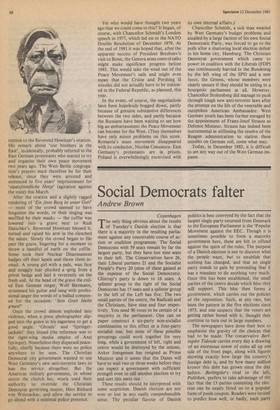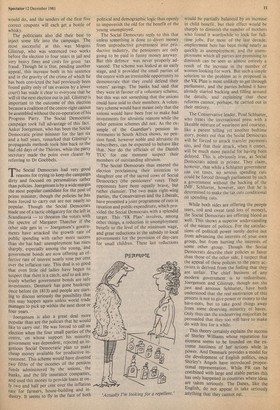Social Democrats falter
Andrew Brown
Copenhagen
The only thing obvious about the results of Tuesday's Danish election is that there is a majority in the resulting parliament against any conceivable course of action or coalition programme. The Social Democrats with 59 seats remain by far the largest party, but they have lost nine seats to their left. The Conservatives have 26, their Liberal partners 21 and the Socialist People's Party 20 (nine of these gained at the expense of the Social Democrats). Glistrup's party is down to 16 seats. A splinter group to the right of the Social Democrats has 15 seats and a splinter group to the left of the Left has five. The two small parties of the centre, the Radicals and the Christians, have nine and four respectively. You need 90 votes to be certain of a majority in the parliament. One can on paper construct a six-party non-socialist combination to this effect or a four-party socialist one, but none of these possible groupings could work together for very long, while a government of left, right and centre would be destroyed by the unions. Anker Joergensen has resigned as Prime Minister and it seems that the Danes will have to wait two or three weeks before they can expect a government with sufficient strength even to call another election to try and sort this mess out.
These results should be interpreted with some scepticism. Danish election are not won or lost in any easily comprehensible sense. The peculiar flavour of Danish politics is best conveyed by the fact that the largest single party returned from Denmark to the European Parliament is the 'Popular Movement against the EEC. Though it is sometimes possible to form a majority government here, these are felt to offend against the spirit of the rules. The purpose of a Danish election is not to discover what the people want, but to establish that nothing has changed, and that no single party stands to gain by pretending that it has a mandate to do anything very much. Once this has been established, the small parties of the centre decide which bloc they will support. This bloc then forms a government, which carries out the policies of the opposition. Such, at any rate, has been the pattern in the five elections since 1973, and one suspects that the voters are getting rather bored with it, thought they continue to turn out in large numbers.
The newspapers have done their best to emphasise the gravity of the choices that had to be made. The conservative Berlingske Tidende carries every day a drawing of an enormous tower of coins all up one side of the front page, along with figures showing exactly how large the country's foreign debt is, and by how many million kronor this debt has grown since the day before. Berlingske's rival to the left, Politiken, prefers to take advantage of the fact that the 13 parties contesting the election can be neatly fitted on to a popular form of pools coupon. Readers were invited to predict how well, or badly, each party would do, and the senders of the first five correct coupons will each get a bottle of whisky.
The politicians also did their best to inject some life into the campaign. The most successful at this was Mogens Glistrup, who was sentenced two weeks before the election to four years in jail and very heavy fines and costs for gross tax fraud. Though he is free, pending another appeal, this increase both in his sentence and in the gravity of the crime of which he has been convicted (he had previously been found guilty only of tax evasion by a lower court) has made it clear to everyone that he will sit the next election out in jail. Glistrup is important to the outcome of this election because a coalition of the centre-right cannot be assembled without the co-operation of his Progress Party. The Social Democratic campaign took full advantage of this fact. Anker Joergensen, who has been the Social Democratic prime minister for the last six and a half years, remarked that Glistrup's propaganda methods took him back to the bad old days of the Thirties, while the party secretary made the point even clearer by referring to Dr Goebbels.
The Social Democrats had very good reasons for trying to keep the campaign dirty and focused on personalities rather than policies. Joergensen is by a wide margin the most popular candidate for the post of prime minister, though the policies he has been forced to carry out are not nearly so popular. Though the Social Democrats made use of a tactic obligatory for the left in Scandinavia — to threaten the voters with the spectre of Margaret Thatcher if the other side gets in — Joergensen's governments have attacked the growth rate of public spending with rather more success than she has had: unemployment has risen sharply, especially among the young, and government bonds are now offering an effective rate of interest nearly nine per cent over the inflation rate. This deal is so good that even little old ladies have begun to suspect that there is a catch, and to ask anxiously whether government bonds are safe investments. Denmark has gone bankrupt once before (in 1813) and people are starting to discuss seriously the possibility that this may happen again unless world trade manages to pick up within the next three or four years.
Joergensen is also a great deal more popular than are the policies that he would like to carry out. He was forced to call an election when the four small parties of the centre, on whose support his minority government was dependent, rejected an ingenious Social Democratic plan to make cheap money available for productive investment. This scheme would have diverted two fifths of the incomes of the pension funds administered by the unions, the banks, and the life insurance companies, and used this money to provide loans at only two and half per cent over the inflation rate for farmers, house-building and industry. It seems to fly in the face of both political and demographic logic thus openly to impoverish the old for the benefit of the young unemployed.
The Social Democrats reply to this that unless something is done to divert money from unproductive government into productive industry, the pensioners are only going to be paid in funny money anyway. But this defence was never properly advanced. The scheme was leaked at an early stage, and it provided the small parties of the centre with an irresistible opportunity to demonstrate that they could defend their voters' savings. The banks had said that they were in favour of a voluntary scheme, but this was not something that the unions could have sold to their members. A voluntary scheme would have meant only that the unions would have been free to make bad investments for altruistic reasons while the other pension schemes did not. As the example of the Guardian's pension investments in South Africa shows, no pension fund, however noble and altruistic its subscribers, can be expected to behave like that. Nor do the officials of the Danish TUC for one moment suspect their members of outstanding altruism.
The Social Democrats thus entered the election proclaiming their intention to slaughter one of the sacred cows of Social Democracy (the pensioners' vote). Their opponents have been equally brave, but rather clumsier. The two main right-wing parties, the Conservatives and the Liberals, have presented a joint programme of cuts in taxation and public expenditure, which provided the Social Democrats with a splendid target. This `VK Plan' involves, among other things, a reduction in unemployment benefit to the level of the minimum wage, and great reductions in the subsidy to local governments for the provision of day-care for small children. These last reductions would be partially balanced by an increase in child benefit, but their effect would be sharply to diminish the number of mothers who found it worthwhile to look for fulltime jobs. For most of the last decade, employment here has been rising nearly as quickly as unemployment, and the unemployment which all parties are promising to diminish can be seen as almost entirely a result of the increase in the number of women looking for work. But such a simple solution to the problem as is proposed in the VK Plan is most unlikely to get through parliament, and the parties behind it have already started backing and filling around the details, and explaining that these reforms cannot, perhaps, be carried out in their entirety.
The Conservative leader, Poul Schlueter, who treats the international press with a likeable mixture of weariness and courtesy, like a parent telling yet another bedtime story, points out that the Social Democrats will be forced to attack transfer payments too, and that their attack, when it comes, will be much more painful for having been delayed. This is obviously true, as Social Democrats admit in private. They claim, however, that while a Schlueter government can cut taxes, no serious spending cuts could be forced through parliament by such a government without the backing of the IMF. Schlueter, however, says that he is determined to make the tax cuts conditional on spending cuts.
While both sides are offering the people tears, toil and sweat (and lots of money), the Social Democrats are offering blood as well. This shows a superior understanding of the nature of politics. For the satisfactions of political power surely derive not from advancing the interests of your own group, but from hurting the interests of some other group. Though the Social Democrats describe their policies as fairer than those of the other side, I suspect that the appeal of these policies to the party activists is derived from the feeling that they are unfair. The chief business of any modern government is to redistribute. Joergensen and Glistrup, though not the just and anxious Schlueter, have both understood that the real motivation of this process is not to Rive power or money to the have-nots, but to take good things away from some deserving minority of haves. Only thus can the undeserving majorities be persuaded that they too will have to make do with less for a while.
This theory certainly explains the success of Shirley Williams whose reputation for niceness seems to be founded on the extreme nastiness of her actions while in power. And Denmark provides a model for the development of English politics, once Shirley's Angels have introduced proportional representation. While PR can be combined with large and stable parties this has only happened in countries where ideas are taken seriously. The Danes, like the English, do not appear to take seriously anything that they cannot eat.







































 Previous page
Previous page